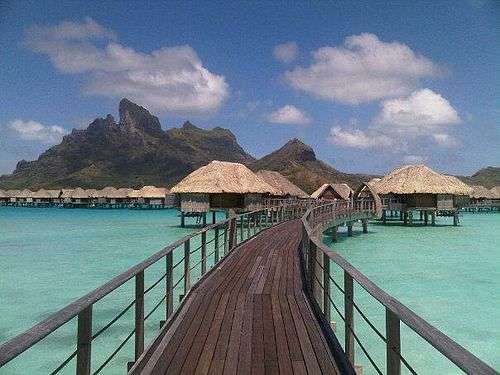Resort island
A resort island (French Île-hôtel; "hotel island") is a hotel complex located on an island; in many cases one luxury hotel may own the entire island. More broadly, resort island can defined as any island or an archipelago that contains resorts, hotels, overwater bungalows, restaurants, tourist attractions and its amenities, and might offer all-inclusive accommodations.[1] It primary focus on tourism services and offer leisure, adventure, and amusement opportunities.
Resort island is often confused or identified with island resort, which is a resort located on an island. Island resort is almost the same with seaside resort or beach resort, which offers beaches and water sport activities, such as sunbathing, swimming, snorkeling, scuba diving and surfing, the only difference is that seaside resorts might located on the continent's seaside, while island resorts must be located on an island or archipelago.

Resort islands mostly rely on their natural environment to attract visitors, such as beaches, biodiversity of coral reefs and forest, or secluded and private locations. Others might rely on their man-made built attractions, such as spas, amusement parks, casinos or nightlife.
On the one hand, the development of a small island into a resort often entails serious environmental degradation (reef digging, sewage, sand pumping...);[2] on the other, a resort island complex can provide shelter for heavily poached species, as resorts own security services that no marine protected area can afford.[3]
Resort islands around the world
Australia
China
France
India
- Bangaram Island
Indonesia
- Bali
- Lombok
- Gili Islands
- Bintan Island resort
- Saronde Island
- Moyo Island resort
- Wakatobi
Japan
Korea
Mozambique
Portugal
Singapore
- Sentosa Island
Spain
Taiwan
- Penghu Islands
Tanzania
United States
Vietnam
- Phu Quoc
References
- "Resorts". Island.com.
- Domroes, M. (2001). "Conceptualising State-Controlled Resort Islands for an Environment-Friendly Development of Tourism: The Maldivian Experience". Singapore Journal of Tropical Geography. 22: 122–137. doi:10.1111/1467-9493.00098.
- Charlotte Moritz; Frédéric Ducarme; Michael J. Sweet; Michel D. Fox; Brian Zgliczynski; Nizam Ibrahim; Ahmed Basheer; Kathryn Furby; Zachary Caldwell; Chiara Pisapia; Gabriel Grimsditch; Ameer Abdulla (2017). "The "resort effect": Can tourist islands act as refuges for coral reef species?". Diversity and Distributions. 23 (11): 1301–1312. doi:10.1111/ddi.12627. hdl:10545/621852.